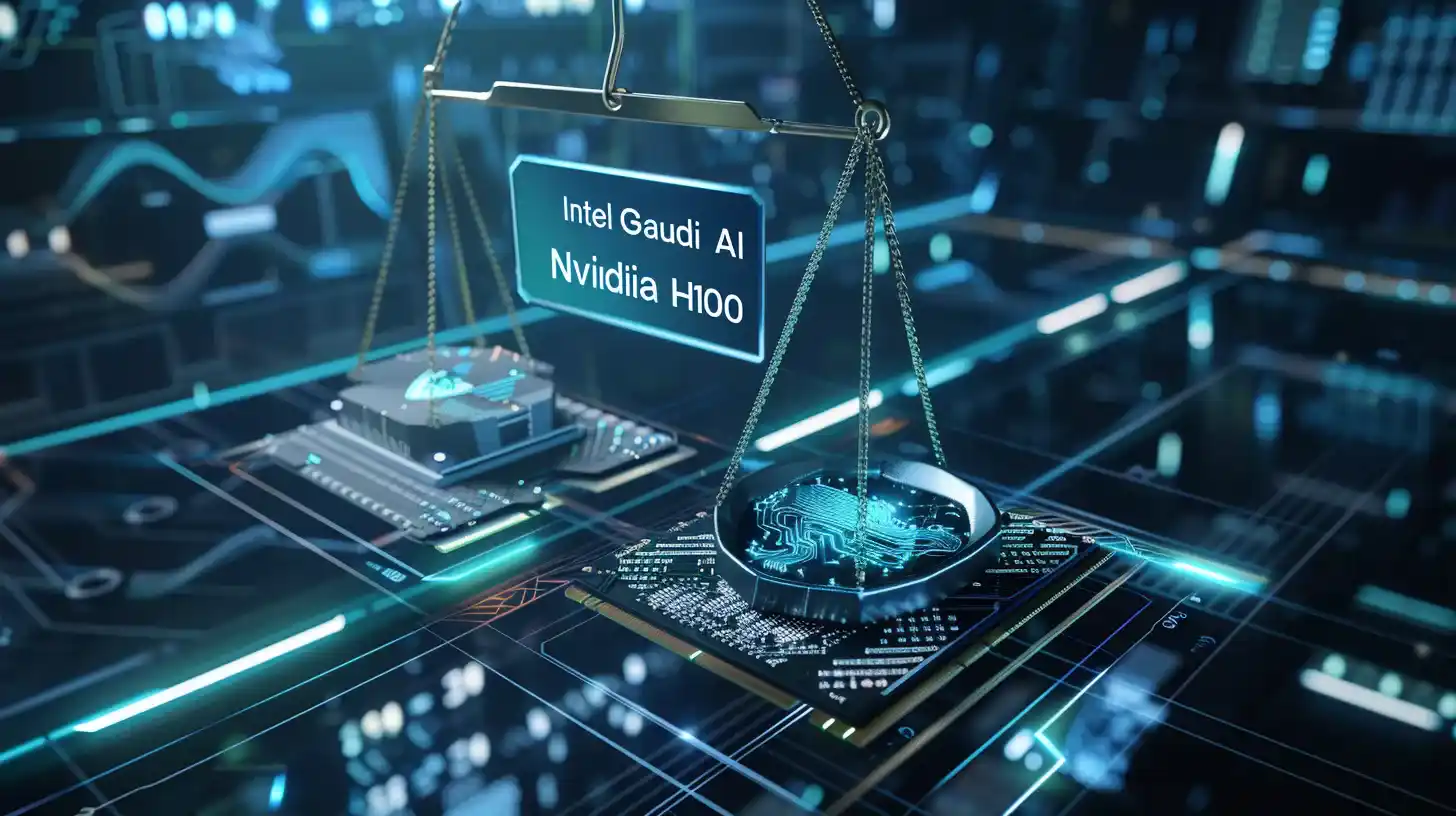Table of Contents
Intel Gaudi 3 AI Chip: A Potent Contender in AI AccelerationIn a significant development in the field of artificial intelligence (AI), Intel has introduced its latest AI accelerator chip, the Gaudi 3, during its Vision 2024 event in Phoenix. This new entry not only exemplifies technological advancement but also positions itself as a robust competitor against Nvidia’s established H100 GPU in data centers.
Intel Gaudi 3 AI Chip: Redefining Performance Standards
The Intel Gaudi 3 AI Chip, Intel’s newest foray into the AI chip market, brings a promise of enhanced capabilities and efficiency. Designed as an alternative to Nvidia’s H100, which has seen widespread use but also significant supply shortages, the Gaudi 3 aims to not just match but surpass its competitor with considerable performance improvements.
Intel’s projections are ambitious, claiming a 50 percent faster training time on notable large language models such as OpenAI‘s GPT-3 with 175 billion parameters and the 7-billion parameter version of Meta’s Llama 2. This enhancement in performance extends to inference tasks—where AI models are run to generate outputs—where the Intel Gaudi 3 AI Chip also achieves a 50 percent speed advantage over the H100.

This superior performance could be a game changer for tech companies and AI researchers, who have previously struggled with accessing sufficient GPU resources due to the H100’s limited availability.
Architectural Advances and Market Implications
Intel Gaudi 3 AI Chip is built on the foundation of its predecessor, Gaudi 2, and features two identical silicon dies linked by a high-bandwidth connection. Each die boasts a central cache memory of 48 megabytes, surrounded by four matrix multiplication engines and 32 programmable tensor processor cores, totaling 64 cores. This design significantly enhances the AI computing performance, offering double that of the Gaudi 2.
Additionally, the Intel Gaudi 3 AI Chip supports 128GB of HBMe2 memory and boasts an impressive 3.7TB of memory bandwidth. Such specifications not only contribute to the chip’s computational power but may also offer a more cost-effective solution in the AI hardware market.
Power efficiency is another critical aspect where the Intel Gaudi 3 AI Chip stands out. Intel claims the chip offers 40 percent greater inference power efficiency for various models compared to its Nvidia counterpart, thanks to its large-matrix math engines that require less memory bandwidth.
Price and Availability: A Strategic Advantage?
While Intel has not disclosed the exact pricing for the Gaudi 3, it’s speculated to be significantly less than Nvidia’s H100, which is priced between $30,000 and $40,000. If Intel can maintain a competitive price point and ensure steady production, Gaudi 3 could capture a substantial market share, especially considering the ongoing shortages and high demand for Nvidia’s products.
Competition Heats Up in the AI Chip Market
The introduction of Gaudi 3 comes at a time when other tech giants are also heavily invested in developing their AI accelerators. AMD is notable with its Instinct MI300 Series, priced between $10,000 and $15,000, offering another affordable alternative in the AI acceleration space.
Google continues to innovate with its tensor processing units (TPUs), used internally since 2015, while Nvidia is not far behind with announcements of its upcoming AI chips like the H200 and the Blackwell B200, though these are yet to be released.

The Future of Intel’s AI Innovations
As Intel rolls out the Gaudi 3, the industry watches closely. The chip is manufactured using TSMC’s advanced N5 process technology, which helps narrow the technological gap between Intel and Nvidia. Looking forward, the Intel Gaudi chip line remains a focal point of interest, with Falcon Shores, the next-generation chip, already generating buzz due to its potential advancements in AI computing capabilities.
Intel’s strategic use of TSMC’s technology, alongside its internal developments in semiconductor fabrication, such as the upcoming nanosheet transistor technology, could further enhance its competitive position in the AI accelerator market.
Conclusion
Intel’s launch of the Gaudi 3 AI chip marks a significant milestone in the evolution of AI technology. By offering enhanced performance, efficiency, and potentially lower pricing, Intel not only challenges the current market leaders but also sets new standards for what businesses and researchers can expect from AI acceleration technology.
The continued innovation and competition in this field signal a dynamic future, where AI capabilities are increasingly accessible and powerful, driving forward the boundaries of what’s possible in technology and beyond.